As a horse keeper, we’re sure the thought has crossed your mind before about how you can give your horse the finest care possible. Or perhaps you are thinking about getting a horse and have many questions that need answering.
You may be wondering, “How long can a horse go without water?” “How frequently do I need to feed it?” “What will be the expenses in terms of money and time?” Caring for a horse can be somewhat overwhelming since there are so many things to consider, like grooming, feeding, and keeping it in tiptop condition.
However, as we all are aware, the significance of several things outweighs the relevance of others. If you ask any well-informed horse keeper what the most critical elements are when it comes to horses, the response will be water and food. Water plays a crucial role in providing your horse with sufficient nutrition and ensuring it stays hydrated.
How Much Water Does a Horse Drink in a Day?
A horse, like people, prefers cool freshwater throughout the summer months. However, excessively cold or semi-frozen water can cause health issues during the colder winter months. Throughout the winter, people prefer a cup of strong hot tea, espresso, or chocolate to warm themselves up from the inside.
Horse caretakers found that boiling their horses’ drinking water throughout the winter helps them drink more water. Furthermore, a typical horse will consume five to ten gallons of fresh water each day. Not all horses need or drink equal amounts of water, just like humans.
How Long Can A Horse Go Without Water?
So, here is the answer to the question that many horse keepers are looking for.
Surprisingly, a horse can survive for at least a month or nearly a month without eating. However, this does not apply to water. A horse cannot survive without water for longer than five days. Once a horse goes without any water for two days, signs of colic set in, which will quickly progress to lethargy, and ultimately dehydration.
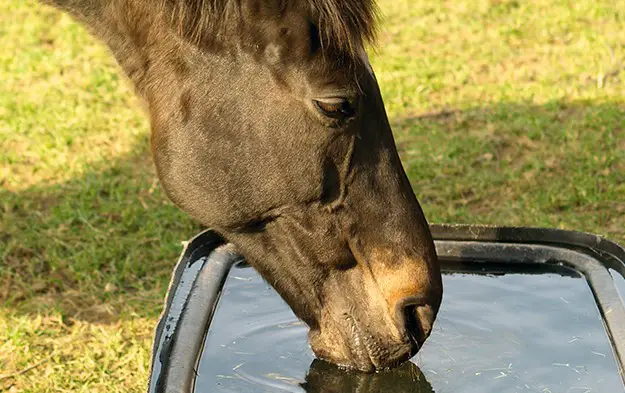
Dehydration is directly linked to a horse’s physical condition. For horses to be physically fit, they need to get enough exercise, be well-fed, and stay hydrated. Being deprived of water can lead to severe health issues that you can avoid by ensuring access to fresh water every day.
Horse Mechanism
Let us look at some of the vital factors of a horse’s mechanism:
- For example, a horse’s muscles comprises 75% water, the brain 85%, and the bones 30%. Because water is a major component of a horse’s body and makes up about sixty percent of its body weight, it needs plenty of water to survive.
- Horses use electrolytes in their anatomy to transport water across cell membranes. This helps maintain the horse’s system, ensuring it stays regulated and functions correctly. When a horse sheds too much water and electrolytes, it develops physiological problems such as decreased muscular performance, spasms, tiredness, and other symptoms.
- Horses, like humans, dehydrate as a result of over-exertion. Sweating in horses performs the same purpose as sweating in humans: to ensure they do not overheat. When humans and horses dehydrate, it is due to their bodies losing electrolytes and fluids that need replenishing.
- Aside from the primary reasons mentioned above, other variables might lead to dehydration in a horse. They include very high body temperature or fever, diarrhea, riding or sporting events, and, occasionally, chilly weather.
The elements mentioned above are what competent horse caretakers should be on the lookout for, and if they suspect their horses might be dehydrated, they must address the issue swiftly. That is why horse owners must be able to identify whether a horse is dehydrated or not.
Checking for the Dehydration in a Horse
Taking a blood sample is by far the most accurate approach to assess dehydration. Your vet may also order a urine test. You may also identify symptoms of dehydration on your horse through other techniques. However, urine tests and blood samples are the most reliable methods.
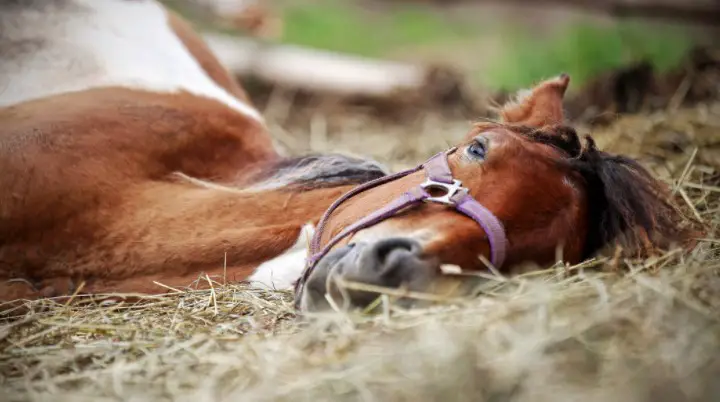
The Pinch Test
When a horse’s skin becomes dehydrated, it loses flexibility. The pinch check is the simplest way to assess for indications of dehydration in your animal. Pinch up a skin fold on the horse’s spine, towards the bottom of his neck, or on his lower torso. Hold it for three seconds before releasing it.
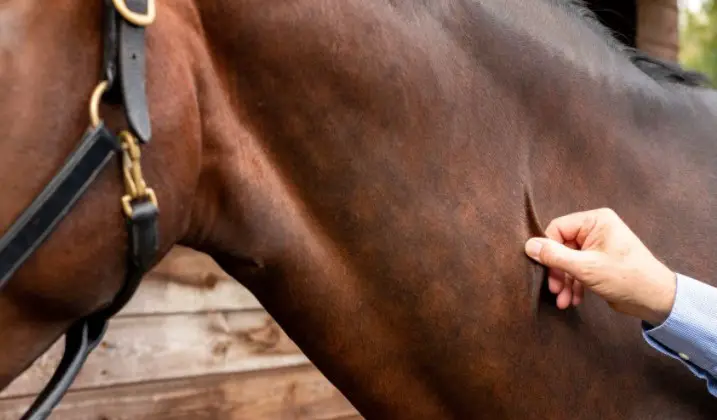
If your horse is dehydrated, the skin will remain raised in a hump for ten to fifteen seconds, indicating the intensity of the dehydration. If the horse seems dehydrated, seek veterinary attention right away.
Respiration Rate Check
The respiration rate check is a quick and simple check. An average horse’s breathing speed ranges from eight to twelve breaths in a minute. When a horse is dehydrated, he will take short and shallow breaths. It is because his system tries to shift essential resources from one organ to another to return a sense of normality.
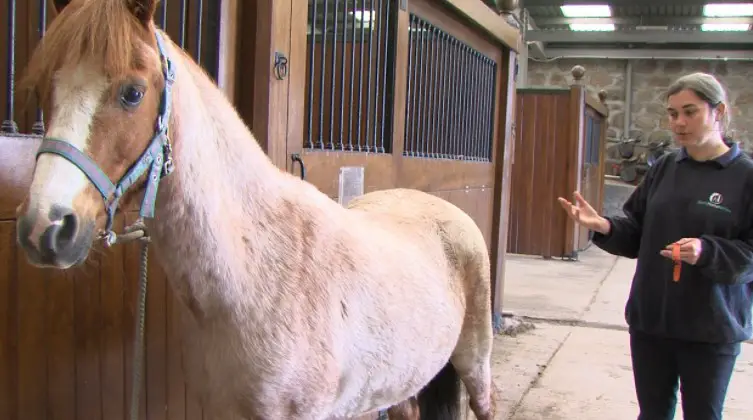
The Heart Rate Check
The resting heart rate of an average horse is between thirty-six and forty-two beats per minute. Monitor your horse’s heartbeat for sixty seconds for the best results. A resting heart rate higher than sixty beats per minute may indicate dehydration.
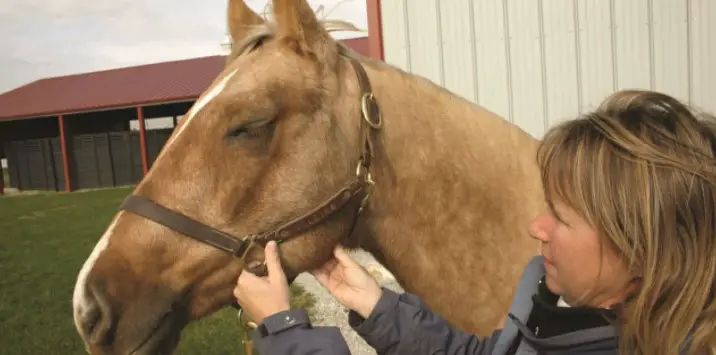
Examine the Eyes and the Gums
Another easy test is to softly push and relax your horse’s gum around his upper teeth. The mucosal tissue should be bright and wet. Obnoxiously red gums, as well as dry eyes, might signal that the horse is transferring water from those areas to other areas in the body. A longer replenishment time entails a greater risk of dehydration.
Urine Check
Dehydration may occur in a horse that generates dark urine or has not produced pee for a lengthy period.
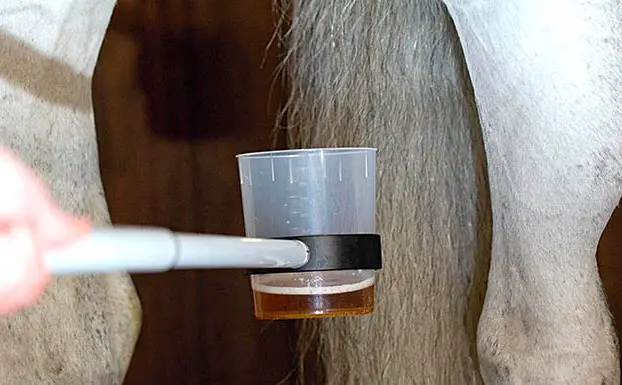
Conclusion
Water is a highly crucial element for a living body, whether it is a horse, human, or any other living being. Because a horse’s body comprises mostly water, being devoid of nutrition but given drinking water can keep him alive for twenty to twenty-five nights.
On the other hand, a horse that does not have access to fresh water can only last three or six nights. After two days without water, a horse might struggle to eat and develop indications of colic and other hazardous diseases, which is the last thing you want.
Now that you know how much water a horse needs, you can make sure that your animal is well cared for and remains in excellent condition.
